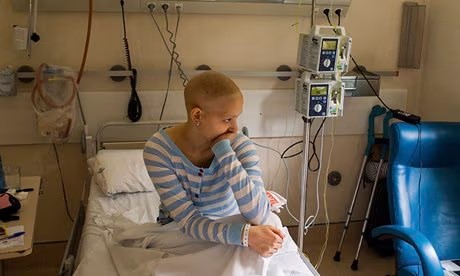Why are so many young people getting cancer? What the data has to say. Clues to a modern mystery could be lurking in information collected generation
Why are so many young people getting cancer? What the data has to say. Clues to a modern mystery could be lurking in information collected generations ago.
Of the many young people whom Cathy Eng has treated for cancer, the person who stood out the most was a young woman with a 65-year-old’s disease. The 16-year-old had flown from China to Texas to receive treatment for a gastrointestinal cancer that typically occurs in older adults. “She had such advanced disease, there was not much that I could do,” says Eng, now an oncologist at Vanderbilt University Medical Center in Nashville, Tennessee, reports Nature.
Eng specializes in adult cancers. And although the teenager, who she saw about a decade ago, was Eng’s youngest patient, she was hardly the only one to seem too young and healthy for the kind of cancer that she had.

Thousands of miles away, in Mumbai, India, surgeon George Barreto had been noticing the same thing. The observations quickly became personal, he says. Friends and family members were also developing improbable forms of cancer. Barreto is now at Flinders University in Adelaide, Australia, reports Nature.
As oncologists such as Barreto and Eng gathered hard data. Statistics from around the world are now clear: The rates of more than a dozen cancers are increasing among adults under the age of 50. This rise varies from country to country and cancer to cancer, but models based on global data predict that the number of early-onset cancer cases will increase by around 30% between 2019 and 2030.

In the United States, colorectal cancer, which typically strikes men in their mid-60s or older, has become the leading cause of cancer death among men under 50. In young women, it has become the second leading cause of cancer death, reports Nature.
As calls mount for better screening, awareness and treatments, investigators are scrambling to explain why rates are increasing. The most likely contributors, such as rising rates of obesity and early-cancer screening, do not fully account for the increase. Some are searching for answers in the gut microbiome or in the genomes of tumours themselves. But many think that the answers are still buried in studies that have tracked the lives and health of children born half a century ago.

“If it had been a single smoking gun, our studies would have at least pointed to one factor,” says Sonia Kupfer, a gastroenterologist at the University of Chicago in Illinois. “But it doesn’t seem to be that, it seems to be a combination of many different factors”, reports Nature
In some countries, including the United States, deaths owing to cancer are declining thanks to increased screening, decreasing rates of smoking and new treatment options. Globally, however, cancer is on the rise. Early-onset cancers, often defined as those that occur in adults under the age of 50, still account for only a fraction of the total cases, but the incidence rate has been growing.

This rise, coupled with an increase in global population, means that the number of deaths from early-onset cancers has risen by nearly 28% between 1990 and 2019 worldwide. Models also suggest that mortality could climb, reports Nature.
Often, these early-onset cancers affect the digestive system, with some of the sharpest increases in rates of colorectal, pancreatic and stomach cancer. Globally, colorectal cancer is one of the most common cancers and tends to draw the most attention. But others, including breast and prostate cancers, are also on the rise.
In the United States, where data on cancer incidence is particularly rigorous, uterine cancer has increased by 2% each year since the mid-1990s among adults younger than 50. Early-onset breast cancer increased by 3.8% per year between 2016 and 2019, reports Nature.

The rate of cancer among young adults in the United States has increased faster in women than in men, and in Hispanic people faster than in non-Hispanic white people. Colorectal cancer rates in young people are rising faster in American Indian and Alaska Native people than they are in white people. And Black people with early onset colorectal cancer are more likely to be diagnosed younger and at a more advanced stage than are white people, reports Nature.
Cancer’s shift to younger demographics has driven a push for earlier screening. Advocates have been promoting events targeted at the under 50s. And high-profile cases, such as the 2020 death of actor Chadwick Boseman from colon cancer at the age of 43, have helped to raise awareness. In 2018, the American Cancer Society urged people to be screened for colorectal cancer starting at age 45, rather than the previous recommendation of 50.

Researchers have also looked at the microorganisms that reside in the human body. Disruptions in microbiome composition, such as those caused by dietary changes or antibiotics, have been linked to inflammation and increased risk of several diseases, including some forms of cancer. Whether there is a link between the microbiome and early-onset cancers is still in question: results so far are still preliminary and it’s difficult to gather long-term data, says Christopher Lieu, an oncologist at the University of Colorado Cancer Center in Aurora. “The list of things that impact the microbiome is so extensive,” he says. “You’re asking people to recall what they ate as kids, and I can barely remember what I ate for breakfast”, reports Nature.

Another approach is to scrutinize the differences between countries. For example, Japan and South Korea are located near one another and are similar economically. But early-onset colorectal cancer is increasing at a faster rate in South Korea than it is in Japan, says Tomotaka Ugai, a cancer epidemiologist at Harvard Medical School. Ugai and his collaborators hope to determine why.
The prominence of gastrointestinal cancers and the coincidence with dietary changes in many countries point to the rising rates of obesity and diets rich in processed foods as likely culprits in contributing to rising case rates. But statistical analyses suggest that these factors are not enough to explain the full picture, says Daniel Huang, a hepatologist at the National University of Singapore, “It looks like you need a deeper dive into the data.”
All Credit To: Nature.com



COMMENTS